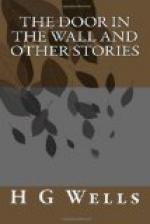“And afterwards when I could go alone I couldn’t find it. I never found it. I seem now to have been always looking for it through my school-boy days, but I’ve never come upon it again.”
“Did the fellows—make it disagreeable?”
“Beastly . . . . . Carnaby held a council over me for wanton lying. I remember how I sneaked home and upstairs to hide the marks of my blubbering. But when I cried myself to sleep at last it wasn’t for Carnaby, but for the garden, for the beautiful afternoon I had hoped for, for the sweet friendly women and the waiting playfellows and the game I had hoped to learn again, that beautiful forgotten game . . . . .
“I believed firmly that if I had not told-- . . . . . I had bad times after that—crying at night and wool-gathering by day. For two terms I slackened and had bad reports. Do you remember? Of course you would! It was you—your beating me in mathematics that brought me back to the grind again.”
III
For a time my friend stared silently into the red heart of the fire. Then he said: “I never saw it again until I was seventeen.
“It leapt upon me for the third time—as I was driving to Paddington on my way to Oxford and a scholarship. I had just one momentary glimpse. I was leaning over the apron of my hansom smoking a cigarette, and no doubt thinking myself no end of a man of the world, and suddenly there was the door, the wall, the dear sense of unforgettable and still attainable things.
“We clattered by—I too taken by surprise to stop my cab until we were well past and round a corner. Then I had a queer moment, a double and divergent movement of my will: I tapped the little door in the roof of the cab, and brought my arm down to pull out my watch. ‘Yes, sir!’ said the cabman, smartly. ’Er—well—it’s nothing,’ I cried. ’My mistake! We haven’t much time! Go on!’ and he went on . . .
“I got my scholarship. And the night after I was told of that I sat over my fire in my little upper room, my study, in my father’s house, with his praise—his rare praise—and his sound counsels ringing in my ears, and I smoked my favourite pipe—the formidable bulldog of adolescence—and thought of that door in the long white wall. ‘If I had stopped,’ I thought, ’I should have missed my scholarship, I should have missed Oxford—muddled all the fine career before me! I begin to see things better!’ I fell musing deeply, but I did not doubt then this career of mine was a thing that merited sacrifice.
“Those dear friends and that clear atmosphere seemed very sweet to me, very fine, but remote. My grip was fixing now upon the world. I saw another door opening—the door of my career.”
He stared again into the fire. Its red lights picked out a stubborn strength in his face for just one flickering moment, and then it vanished again.




